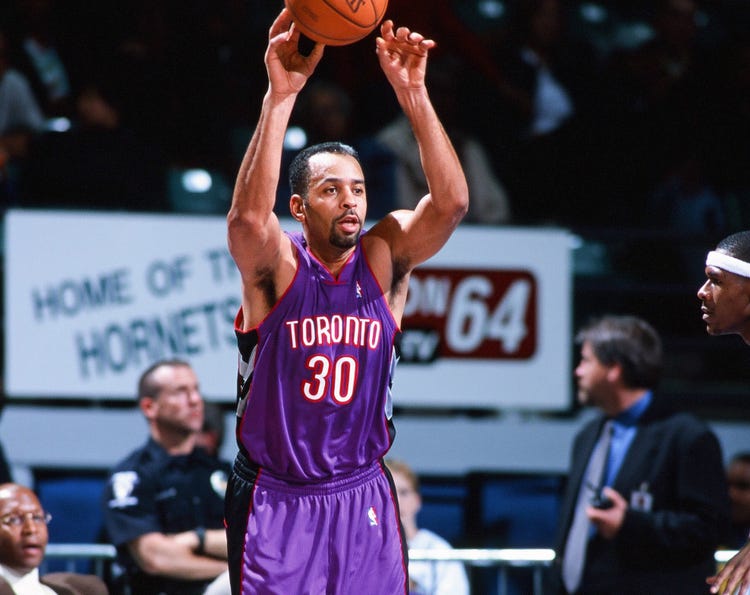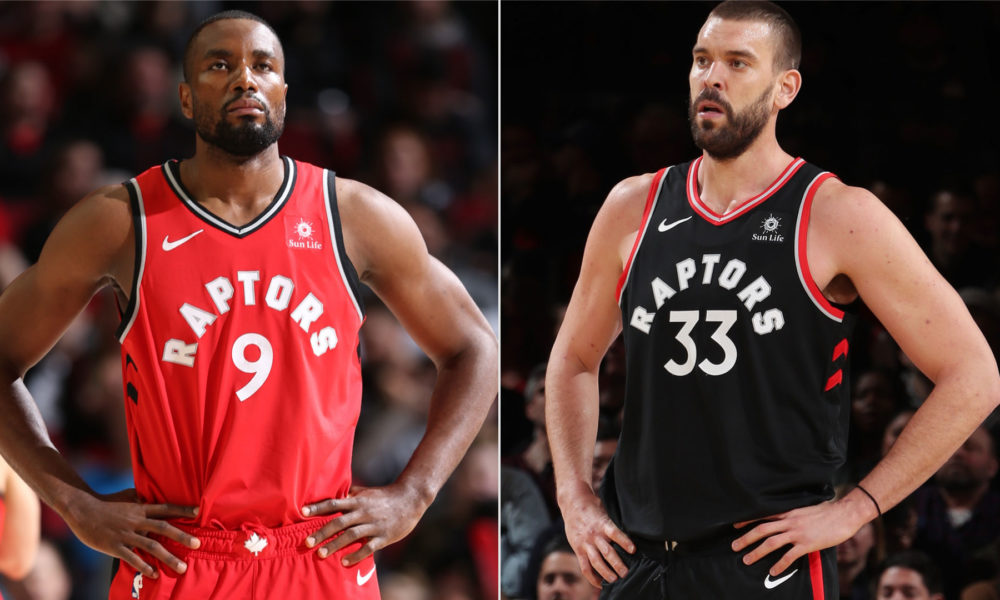Dell Curry played three seasons for the Raptors beginning in 1999-00 including Vince’s prime. Much like the Raptors never quite replaced Tracy McGrady, they also didn’t replace Dell Curry. Yeah, Jason Kapono had a half-decent stretch on a mediocre team but a true dead-eye outside threat alluded them. Dell Curry was that, and he was also a fun dude to watch.
The final basket of Curry’s career in Toronto is notable. His score preceded which became one of the most idiotic and dumbfounding moments in Raptors playoffs history: Chris Child forgetting the score on the deciding possession of the deciding game of the series. Even writing that sentence out makes me cringe, that’s how strong the vibes were.
The scene is The Palace of Auburn Hills on May 2, 2002, Game 5 of a best-of-five series. The Raptors after an injury-riddled season which marked the dawn of Vince Carter’s dramatics, mild in nature still, managed to squeak into the post-season as the 7th seed. They were 42-40, same as the Pacers but held the tie-breaker. Milwaukee finished a single game back and outside the playoff picture. Sam Cassell, Ray Allen and Big Dog Robinson’s Bucks were favorites to make it but had lost 6 of 8 to finish the season, sealing their fate in the East. It never helped the Bucks that Robinson simply refused to bend when receiving any pass. It needed to be in the numbers or else it was someone else’s problem.
The Raptors reward was facing the second seeded and heavily favoured Pistons who were led by Ben Wallace, Jerry Stackhouse and Sixth Man of the Year, Corliss Williamson. Vince Carter missed the entire series through injury, further framing this as a formality. Morris Peterson, Keon Clark, Antonio Davis, Child Childs, and Alvin Williams were the Raptors starting five, with Hakeem Olajuwon, Jerome Williams and Dell Curry coming off the bench. Even though it was a 2/7 matchup, the teams were similar in that they relied on team ball rather than big name players. For Detroit, this was by design. For the Raptors, it was born through necessity.
Detroit won a blowout in Game 1 and the Raptors lost a close one to go down 0-2 as the series shifted to Toronto. Two backs-to-the-wall performances by the Raptors behind Antonio Davis’s 30 points in Game 1 and a strong team performance in Game 2 had the series tied. Fans knew the matchup was tighter than the seeding but this was a welcome surprise. The theater shifted back to Detroit and Game 5 was expectedly testy. The Raptors were up by 9 early and held a 2 point lead with 2:17 left in the fourth. They would have been more comfortably ahead if it weren’t for Corliss Williamson whose post-up game mystified Antonio Davis and Jerome Williams. What hurt even more was that the Raptors had rejected Williamson a year earlier which was making Glen Grunwald look silly.
Now most people have heard of Child Child forgetting the score with 11 seconds left and down two. But that play was found money because the Raptors were down 5 with 21 seconds left, which was Detroit’s biggest lead of the game.
It was at this moment when Dell Curry said goodbye to us. He ended up scoring his last basket for the Raptors on a classic Dell shot. Now what is a classic Dell shot? For starters, he’s not sweating. Sweat is something primordial humans do because of some evolutionary failure that we have come to accept. That gene skipped Dell. Dell found it gross and refused to sweat which made him quite literally a cool guy.
It did not matter which way Dell was facing. Dell was always ready. An NBA scout was once heard saying that Curry could roll out of bed Christmas morning, walk outside in snow, pick up a basketball and drain a three. Studying game film involves figuring out what a shooter’s pre-shot tendencies are, how the ball is gathered, how weight shifts, whether the rim is checked etc. These rules didn’t apply to Dell. He was ready to shoot well before the ball touched his hand because his entire game was pre-shot preparation. He could get into a shooting motion regardless of where any part of his body was.
I sometimes think of a shot as a trebuchet (not a catapult, but a trebuchet). There are the core ideas of a payload, storage of potential energy, conversion to kinetic energy and most importantly, an arc. How quickly this weapon can be readied depends on the dexterity of the machine and the frictionless interplay of pieces that orchestrate the apparatus together. Dell’s game had no friction. Only fluidity.
The patch of gray hear lent him a grandfatherly air. Even though statistically he was one of the best shooters in the league and there were explicit coaching instructions never to leave him alone, that patch of gray year probably had something to do with a defender thinking just sliiiiiggghhhttttllly less of his abilities, especially when combined with his relatively unathletic figure. Luckily for Dell, he only needed sliiiiiggghhht space.
Curry also knew how to peel. There are guys that just know how to evade a defender through a gentle push, a slight-fake and a wandering eye. The likes of Reggie Miller, Rip Hamilton, Ray Allen, Klay Thompson and Kyle Korver come to mind. Curry was of the same ilk in that he’d be dormant and covered in one second, and firing a shot as the defense looked on regretfully in the next. He hid in his defender’s shadow.
Back to Thursday night on May 2, 2002. Dell Curry has not even crossed the half-court line for Stackhouse to shoot his free throws and is waiting on the offensive end. The Tarheel misses a free-throw and Antonio Davis collects the rebound. Unlike Charles Oakley two years before, Davis passes it up immediately to Chris Childs. With no timeouts left and Childs pushing, Child’s draws Dell’s defender for what is a split-second. Curry peels. His man recovers but a split-second is all Dell needs to gather the pass, square his footing, pack the trebuchet and dispatch it in an arc, payload intact.
What followed that play is what most remember and want to forget. What preceded it was Dell Curry’s beautiful signoff.



